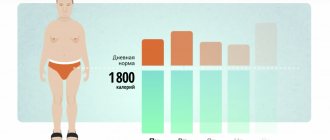We bet that any of you has heard the phrase “to lose weight, you need to eat less” at least once. This has contributed to the emergence of many radical diets, exhausting systems of fasting and nutrition, which are not always effective and often do more harm than good. In fact, it is not so much the frequency of meals that matters, but the quality of food.
In this article we will talk about what to eat, in what quantity and how many times a day to stay healthy and gain a slim figure.
Does the frequency of meals affect our body?
It would seem that the less you eat, the more weight you lose, but the body works differently. When he feels hungry and stressed from lack of food, he begins to accumulate reserves and retain water to use them in case of a critical situation. As a result, this not only provokes the appearance of excess weight, but also leads to further breakdowns, which are accompanied by overeating.
Nutritionists say that the time between meals should be three to five hours. During this period, the contents of the stomach have time to go to the small intestine and a healthy feeling of hunger arises.
In 2010, an 8-week study was conducted in which 16 people took part. They were divided into two groups. One of them ate three times a day, and the other had 3 meals and 3 snacks. In both cases, the total daily caloric intake did not exceed 2931 kcal. As a result, participants in both groups lost 4.7% of body weight and the number of meals did not affect metabolism and fat loss.
So how many times a day do you eat?
In general, it is recommended to eat at least 3 times a day. The calorie content of all meals and snacks depends on many factors, including height, weight, age, gender and activity level. In addition, it is important to monitor the ratio of protein, fat and carbohydrates.
At the same time, you should not avoid new power systems that can become a good alternative. Some of them have proven to be effective ways to keep the body in shape without stressing the body. Among them are fractionated meals and intermittent fasting, which we will talk about in more detail.
Going to the toilet: norms and deviations
Going to the toilet: norms and deviations
The human body is a complex mechanism that functions according to its own regime. Some people feel the urge to urinate 4-5 times a day. Others rush to the toilet every 2-3 hours. For some, daily morning bowel movements are considered the norm. Others empty their bowels twice a day or once every 2 days. What is considered the norm and what is a deviation? What pathologies can be indicated by increased or decreased urination and defecation? How many times should a person normally go to the toilet?
Natural work of the body
The functioning of the urinary and gastrointestinal systems depends on many factors. Among them:
- food (drinks, food);
- ambient temperature;
- climatic conditions;
- concomitant pathologies;
- taking medications;
- amount of water consumed;
- age and condition of the person.
Despite the many factors that can affect the frequency of visiting the toilet, there are certain norms for daily urination and bowel movements. It is within these limits that a healthy body functions.
Normal urination
What is the accepted norm for urination? Doctors believe that adults should visit the toilet on average 4-8 times a day. At the same time, it is considered normal for women to urinate up to 10 times per day.
Sometimes the urge to go to the toilet may occur at night. If a person visited the toilet once during the night, then this is not considered a pathology. More frequent urination during sleep, especially if other unpleasant symptoms are observed, indicates the development of diseases in the body.
Normal bowel movements
During bowel movements, harmful components are eliminated from the digestive tract. If bowel movements do not occur in a timely manner, then the poisons and toxins accumulated in the feces begin to poison the entire body. Therefore, it is important to control the process of defecation, know how often it is recommended to go to the toilet, and understand the indicators of normality and deviations of this process.
Adults usually have bowel movements 1-2 times a day. The process of defecation can occur daily or every other day. If a person feels comfortable, then this frequency is considered normal.
Some people have a bowel movement every 3 days. If a person does not experience discomfort and does not suffer from any pathologies of the digestive system, then this frequency is also considered normal.
What does urination deviation indicate?
We can talk about a deviation only if a person who previously visited the toilet 6 times a day began to urinate 10-12 times or 2-3 times a day. You can only compare current indicators with your own bladder emptying rhythm.
Increased urination
Normally, the number of urinations should not exceed 10 times. If the urge occurs more often, then we can assume the development of pathologies in the body. However, frequent urination does not always indicate illness.
Non-pathological causes
Increased bladder emptying can be caused by the following:
- pregnancy;
- consumption of drinks that have a diuretic effect (lingonberry, cranberry juice, viburnum compote, green tea);
- physical exercise;
- hypothermia of the body;
- the use of drugs with diuretic properties;
- end of the menstrual cycle.
A mandatory visit to a doctor is required if frequent urination is accompanied by a number of unpleasant symptoms, such as:
- burning, stinging during urination;
- temperature increase;
- unpleasant odor of urine;
- change in urine color;
- the presence of purulent inclusions, mucus or blood in the urine.
Pathological causes
Increased urine output can be caused by various pathologies:
1. Diseases of the urinary system . Most often, the culprits are infectious and inflammatory processes occurring in the urinary system. Increased urination may be caused by:
- pyelonephritis;
- cystitis;
- urethritis;
- urolithiasis.
2. Endocrine diseases . Insufficient or excessive production of certain hormones may be accompanied by increased urges. This is usually observed when:
- hyperaldosteronism (excessive synthesis of the hormone aldosterone by the adrenal glands);
- diabetes insipidus;
- hyperparathyroidism (increased production of parathyroid hormone by the parathyroid glands).
3. Gynecological diseases . The urinary system is closely related to the reproductive system. That is why many gynecological disorders are accompanied by a frequent urge to urinate. Increased frequency can be caused by:
- uterine fibroids;
- cysts, tumors of the uterus, ovaries;
- thrush;
- infectious and inflammatory processes (adnexitis, oophoritis, endometritis);
- prolapse of the uterus.
Andrological diseases . The following pathologies can provoke increased urination in men:
- prostate adenoma (this is a benign tumor);
- prostatitis.
If the reasons for frequent trips to the toilet are caused by developing diseases, then the person will encounter not only an increase in the urge, but also a whole “bouquet” of other symptoms.
Decreased urination
If the amount of daily urine decreases sharply, then most often the causes of this disorder are hidden in the following conditions and diseases:
- insufficient water intake;
- dehydration as a result of prolonged diarrhea;
- kidney diseases;
- swelling of soft tissues;
- urolithiasis disease;
- oncology.
Deviations of the defecation process
Normally, stool can be observed from 2 times a day to 1 time in 3 days, provided that you feel normal. Pathology refers to any deviations from the individual bowel movement regimen.
A slowdown in the process, in which the act of defecation is delayed for 1-2 days, is called constipation, and an increase in frequency with a characteristic softening of bowel movements is called diarrhea or diarrhea.
Causes of constipation
The following reasons may be behind the decrease in bowel movements:
1. Wrong lifestyle . Constipation can be caused by:
- poor nutrition, diets;
- insufficient water intake;
- physical inactivity;
- busy schedule;
- frequent moves.
2. Medications . Taking some medications may cause constipation. The following medications have such side effects:
- antidepressants;
- agents that reduce stomach acidity;
- antibiotics;
- antihypertensive medications (for high blood pressure);
- diuretics;
- antihistamines;
- narcotic medications (including those containing codeine).
3. Organic disorders . Constipation occurs as a result of congenital or acquired intestinal abnormalities. The reasons for decreased bowel movements may be hidden in the development of such diseases:
- dolichocolon;
- diverticulosis;
- intestinal obstruction;
- adhesions;
- intestinal strangulation;
- inflammatory processes in the intestinal tract;
- tumors.
4. Functional disorders . Constipation is often associated with the psycho-emotional sphere of a person.
The following reasons may underlie the decrease in bowel movements:
- dyskinesia (atonic or spastic);
- irritable bowel syndrome;
- haemorrhoids;
- anal fissures;
- autoimmune thyroid lesions;
- diabetes.
Increased frequency of bowel movements
Diarrhea is caused by excessive addiction to foods that have a laxative effect (plums, apricots). Don't forget about medications. Incorrect use of antibiotics can cause severe diarrhea. Sometimes diarrhea occurs when the body is poisoned.
Frequent trips to the toilet can be caused by more serious reasons:
- colitis;
- Crohn's disease (an inflammatory process occurring in the intestines);
- dysentery;
- salmonellosis;
- shigellosis;
- liver diseases;
- rectal cancer;
- hyperthyroidism;
- intestinal tuberculosis.
Any disturbances in the body require medical intervention. Making a diagnosis and selecting treatment on your own is strictly prohibited. After all, it is precisely this “independence” that most often results in the development of severe complications, sometimes even irreversible. https://www.medsovet.info/articles/3893
Add a comment Cancel reply
You must be logged in to post a comment.
Fractional meals
Some nutritionists insist on 3 full meals (350 to 600 calories each) and 1 to 3 snacks throughout the day (150 to 200 calories).
The main feature is that you should not go without food for more than 5 hours. Essentially, you divide your daily calorie intake into more meals. This way, you eliminate the prolonged feeling of hunger, which forces you to choose unhealthy and high-calorie snacks, baked goods and fast food.
This allows you to get enough proteins, fats, carbohydrates, vitamins and microelements without strict restrictions and fasting, and since meals occur at regular intervals, the body receives a signal that it does not need to accumulate extra calories and metabolic processes improve.
Before your next meal, ask yourself the following questions:
- Am I hungry? (If you're not sure, wait 20 minutes and ask yourself again)
- When was your last meal? (If less than three hours, this may be so-called “emotional hunger”)
- Will snacking help me? (To do this, have fruits, nuts or dried fruits on hand)
Let's summarize. How to start eating right? Eat regularly and consume 90% of your calories before 8 pm. Pay attention to eating at regular intervals of 4-5 hours. Make sure they are healthy and nutritious and do not exceed the daily recommended caloric intake. This will help regulate your blood sugar levels and also control your hunger.
How many times a day to eat to lose weight?
When there is little glucose, you feel hungry, and when there is a lot, it is not only converted into glycogen, but also stored in the form of fat deposits. There are two main problems – shortage and excess. It is because of them that you cannot lose weight and see the desired number on the scales. However, everything is not as difficult as it seems. It is enough to understand the processes that take place inside the body, and everything will immediately fall into place. It’s very simple to control glucose levels so that there is not too much of it, but there is no shortage either. You just need to eat often, but in small portions. Here is the answer to the question of how many times a day to eat to lose weight - divide meals into 5-7 times.
Intermittent fasting
Intermittent fasting (fasting diet) is a diet for weight loss that involves periodically refusing to eat. Fasting intervals depend on the individual characteristics of the person. There are options 20/4, 14/10, but 16/8 is considered the most popular and optimal. This means that for 16 hours it is forbidden to consume any food, only drinking water is permissible, and the remaining 8 hours are considered the so-called “food window”, when you do not have to limit yourself in food. You just have to take into account your daily caloric intake and not go beyond it.
Many people are scared by the thought of 16 hours of fasting, but sleep is also taken into account here. That is, you can set a schedule, for example, from 12 noon to 8 pm. In fact, only breakfast is missing from the diet.
The reason for switching to this diet was the discovery of Japanese scientist Yoshinori Ohsumi, who received the Nobel Prize in 2021 for his research into the mechanisms of autophagy. In it, he explained that autophagy is a natural regeneration process that occurs at the cellular level during fasting. Essentially, the body begins to get rid of old cellular components (organelles, proteins and cell membranes) that have fulfilled their role and replaces them with new ones. This helps renew the body and even fight Parkinson's disease, type 2 diabetes and other disorders.
Is breakfast important?
There is a lot of conflicting data, so scientists do not have a consensus. Based on research on intermittent fasting, such breaks in food not only do not harm, but also benefit the body if a person receives all the necessary nutrients and microelements during the eating window.
At the same time, an analysis of 19 studies conducted in Asia and the Pacific region confirmed the link between weight gain and skipping the first meal. And it is connected primarily with the fact that the absence of breakfast provokes a feeling of hunger that remains throughout the day (the hormone ghrelin is responsible for this) and the risk of making a high-calorie and harmful snack increases.
In addition, the quality of food is of great importance. If you have sweet cereals with milk, instant cereals, and sweet pastries for breakfast, then they will do more harm than good. It is worth giving preference to balanced dishes, for example, an omelet with vegetables, whole grain oatmeal with fruits or vegetables, toast with avocado and fish, etc.
Scientific explanation of the experts’ correctness
For normal life, a huge number of different processes occur in the body, and all of this is interconnected. This is how a person lives and enjoys his existence. One of these processes is monitoring and assessing the current level of glucose in the blood, as well as its increase when there is a deficiency. All you need to do is force the body to waste its own fat and not accumulate new one. And it's not as difficult as many people think. But you have to try.
So, why, when asked how many times a day to eat to lose weight, do experts answer that you need to eat more often, but in small portions? To prevent a state of critically low or critically high levels of glucose in the blood, which leads to unnecessary reserves. Simply put, if you don’t eat all day and give free rein to your “food passions” in the evening, nothing good will come of it. Just in the first half of the day the level will be critically low, and in the evening, when a person eats, and eats enough food for a day, it will become critically high. Here's why it's dangerous and harmful to your figure:
- Low glucose levels. When glycogen breaks down, the process of gluconeogenesis is stimulated. This is a condition in which the body obtains glucose from lactate, amino acids and glycerol. The release of the latter occurs only during fasting or prolonged physical activity. It is this process that stimulates the destruction of fat reserves. Glucose is also obtained due to the body's destruction of its own muscle tissue to produce amino acids.
- High glucose levels. In this case, insulin is released into the blood. It is a substance that stimulates the formation of fats in adipose tissue. And long live new fat deposits!
Here is a simple answer to the question of how much you should eat per day to lose weight, and not to stimulate the formation of fat. Now it is clear that long breaks between meals should not be allowed.
Does eating before bed cause weight gain?
People eat at night for a variety of reasons. Often they have nothing to do with hunger. As a rule, this is a fight against boredom and stress.
The main risk associated with eating at night is indigestion or stomach upset. They are accompanied by abdominal pain, nausea, an uncomfortable feeling of fullness, bloating or burning. The reasons for the occurrence may be different: portion sizes are too large, eating quickly, eating fatty, smoked, spicy, sour, etc.
A study published in 2021 in the journal Physiology & Behavior concluded that the timing of meals affects metabolic function. In particular, transferring calories to a later date can change the body's circadian rhythm, and, as a result, lead to excess weight.
But this does not mean that you need to go to bed hungry. Scientists agree that regularly skipping dinner can seriously disrupt your metabolism, affect insulin levels and hormonal levels, so don't give up snacks. Do them wisely and a few hours before bed.










